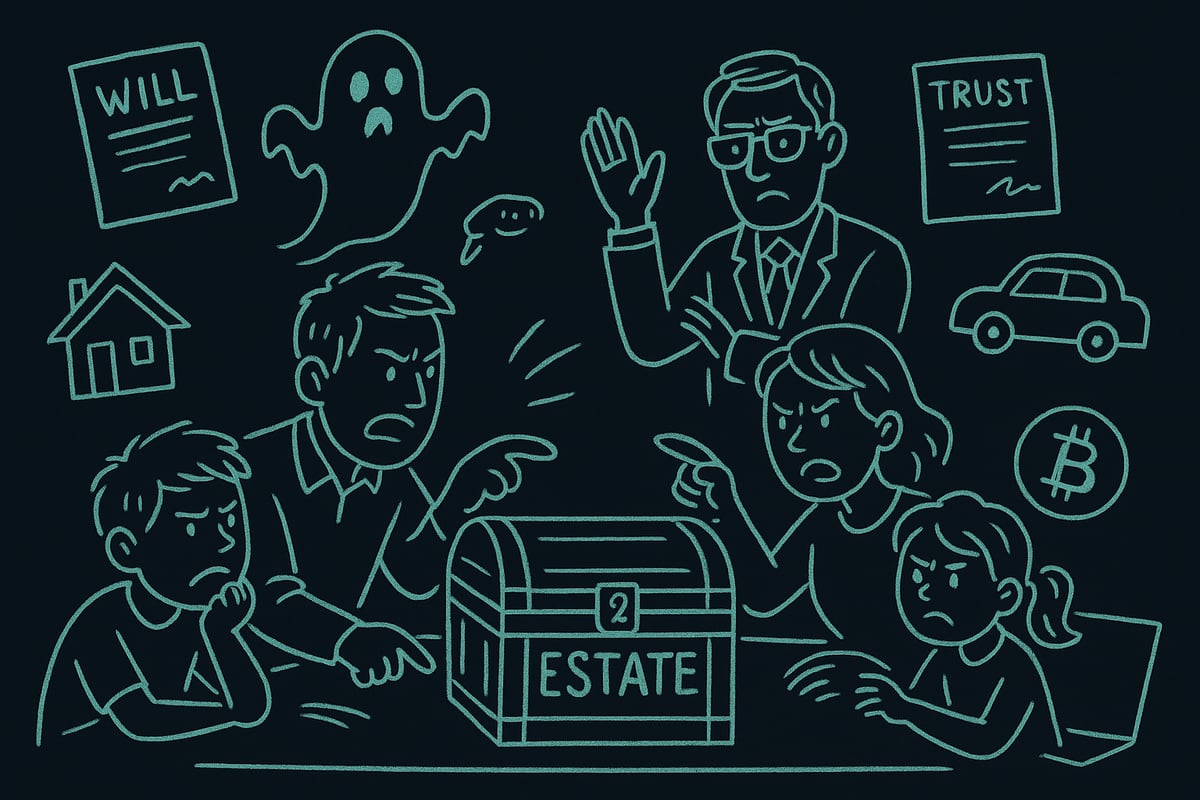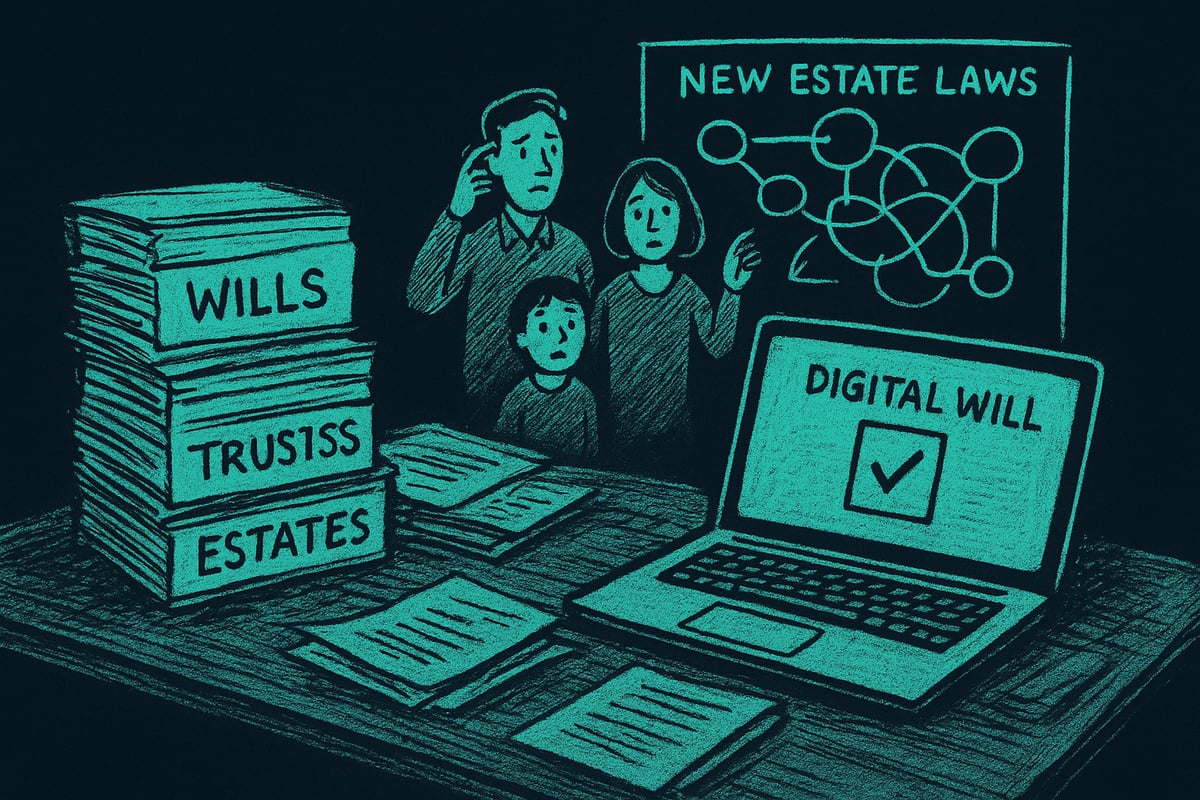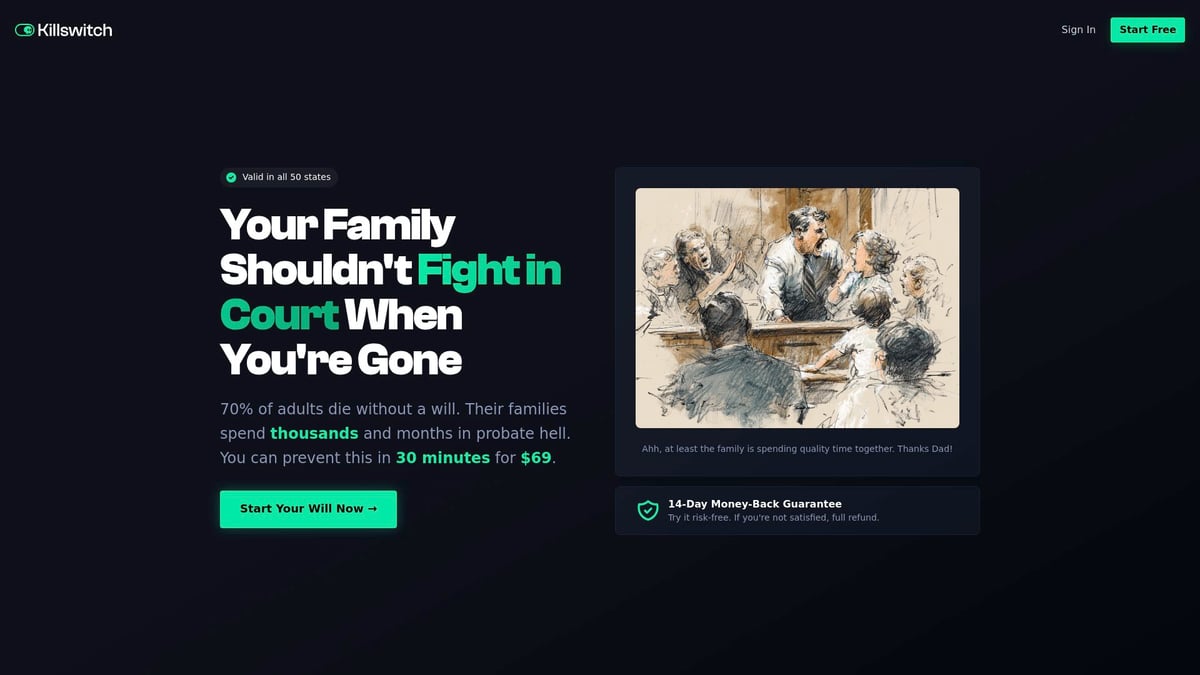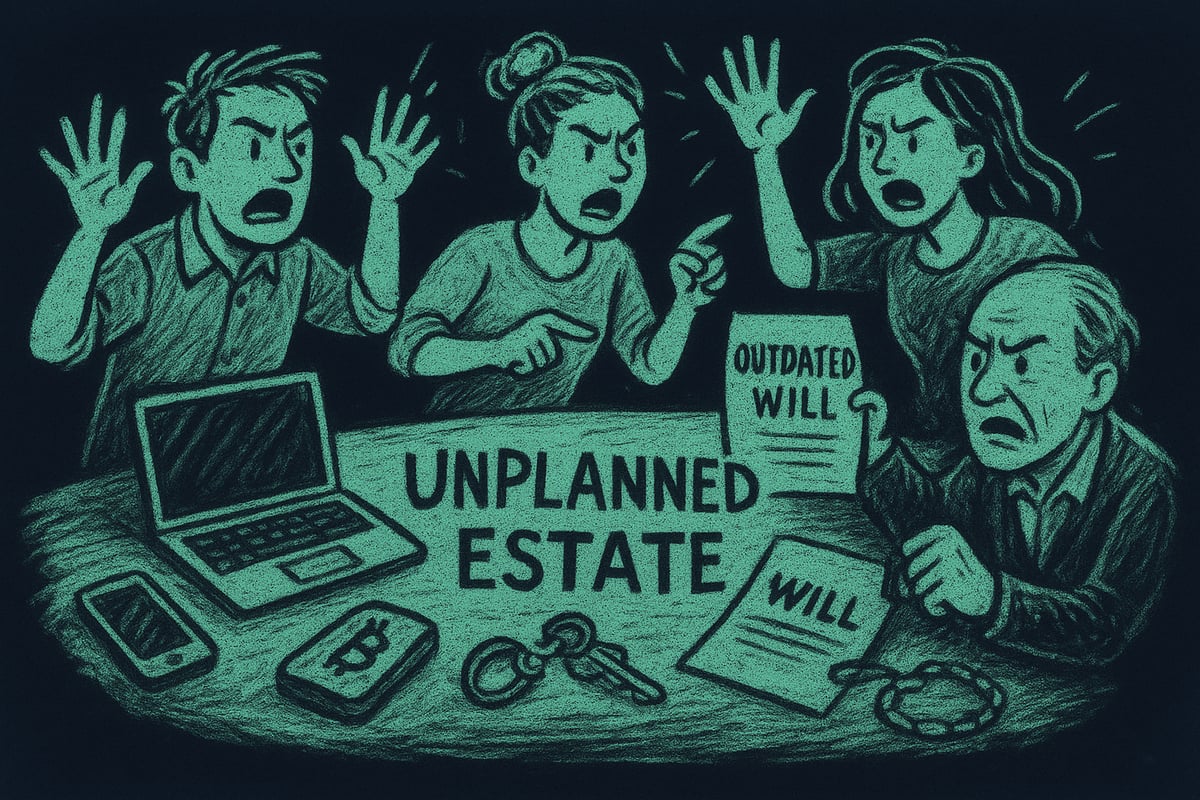Wills, Trusts and Estates Guide: Essential Insights 2025
You’re going to die. Yep, you. Might as well make sure your ex doesn’t get your PlayStation or your crypto wallet, right?
Wills trusts and estates aren’t just for old people with monocles and dusty libraries. In 2025, estate planning is a gladiator arena filled with digital assets, blended families, and enough legal traps to make your head spin.
This guide rips the bandage off. We’ll break down what you actually need to know about wills trusts and estates, spotlight new laws, walk you through planning step by step, debunk classic mistakes, and give you pro-level strategies.
Ready to start planning your death party? Congrats, you’re about to be slightly less irresponsible than you were ten minutes ago.
Understanding Wills, Trusts, and Estates: Core Concepts
Think you can dodge death? Spoiler alert: you can’t. The only thing worse than dying is leaving behind a mess for your loved ones. That’s where understanding wills trusts and estates comes in—so your family doesn’t end up reenacting Game of Thrones over your leftover crypto and collection of rare Beanie Babies.

What is a Will?
A will is your last chance to boss everyone around after you’re gone. Legally, it’s a document where you (the testator) spell out who gets what, who handles your stuff (the executor), and who raises your kids if you have any. Simple wills are for straightforward situations—like leaving everything to your dog. Complex estates need more muscle.
Common types include:
- Simple will (for basic needs)
- Testamentary will (formal, witnessed)
- Pour-over will (feeds into a trust)
- Holographic will (handwritten, valid in some states)
Without a will, state intestacy laws decide everything. Translation: your distant cousin Larry might get your prized PlayStation. Nearly two-thirds of Americans are rolling the dice without a will, according to Trust & Will 2025 Estate Planning Report. Don’t be that person.
What is a Trust?
A trust is like a vault for your assets, managed by a trustee for your chosen beneficiaries. It lets you control who gets what, when, and how—no courtroom drama required. Trusts come in flavors like revocable (you can change it), irrevocable (you can’t), living, testamentary, and special needs.
Why bother? Trusts keep things private, skip probate court, and can save your heirs on taxes. For example, a living trust can protect your family home from going to the highest bidder on the courthouse steps.
Legal must-haves: the grantor, trustee, beneficiaries, and clear terms. Trusts are getting more popular, especially among folks with real assets or complicated families. If you want to control your legacy from beyond the grave, this is your tool.
What Constitutes an Estate?
An estate is basically everything you own—and owe—when you die. Think cash, real estate, investments, cars, grandma’s jewelry, and now, digital assets like your crypto wallet or Instagram account.
Assets fall into two buckets:
- Probate assets (pass through court)
- Non-probate assets (pass directly, like life insurance)
Example: If you own Bitcoin and forget to leave the keys, your heirs might as well try to find Atlantis. Make a full inventory, including digital stuff. Debts get paid before your family sees a dime. Many people think only the rich need to plan, but if you have stuff and people you care about, guess what? You need an estate plan.
Interplay Between Wills, Trusts, and Estates
Wills trusts and estates work best as a team. A will handles anything not placed in a trust, like naming guardians. A trust manages assets for privacy and control. Sometimes you’ll use both—a pour-over will can funnel leftover assets into your trust.
Here’s a simple scenario: Your will leaves your comic book collection to your sister, but your house goes into your trust for your kids. Some assets, like retirement accounts, skip probate if you keep beneficiary designations current. Forget to update after a divorce? Your ex could snag your 401(k).
Probate is public, slow, and sometimes ugly. Trusts speed things up. Laws change, families change, so update your documents or risk chaos. Recent legal tweaks mean blended families and non-traditional heirs have more rights, but only if you spell things out. Bottom line: regularly review your wills trusts and estates to make sure your death party goes off without a hitch.
Legal and Regulatory Trends in Estate Planning for 2025
If you think you can scribble your “last wishes” on a napkin and call it a day, welcome to 2025, where the rules for wills trusts and estates have mutated faster than your favorite streaming service’s terms of use. Let’s break down what’s new, what’s weird, and why you should care (besides the obvious: you are, in fact, going to die).

Evolving Laws and Uniform Probate Code Updates
Remember when estate law was simple? Yeah, neither do we. The Uniform Probate Code has had a facelift, tossing out those dusty gender roles and finally recognizing that families aren’t all cookie-cutter. Stepchildren and non-biological kids are getting more love in the statutes, which means your estate plan can reflect your real family—not just your DNA.
States are racing to adopt these new probate laws, but, surprise, they’re not all on the same page. Blended families need to pay special attention, because what counts as “next of kin” is shifting. If you rely on outdated assumptions, your wills trusts and estates plans might leave your loved ones in a legal limbo.
- New laws give more rights to stepkids and non-traditional heirs
- State rules still vary wildly, so don’t copy your neighbor’s plan
- Real-world example: Stepchildren now have clearer inheritance paths
Bottom line: If your family tree looks like a shrub, update your documents before some distant cousin claims your vinyl collection.
The Rise of Digital and Electronic Wills
Paper is so last century. In 2025, digital and electronic wills are the hot ticket, especially after COVID turbocharged remote everything. Now, you can sign your will from your couch, as long as your state is cool with it. But don’t get too comfy—fraud prevention and proper storage are still big issues.
A bunch of states now accept e-wills, but each has its own hoops to jump through. Remote execution and digital witnesses sound futuristic, but botched authentication can turn your wishes into a tech nightmare.
- Digital will signing platforms must meet strict compliance
- Storage is critical—lose your password, lose your legacy
- Wills trusts and estates now require digital asset planning too
Pro tip: Check your state’s rules before you rely on an app to save your estate from chaos.
Asset Protection Trusts and Decanting
Want to keep creditors and greedy exes away from your stuff? Asset protection trusts are booming in 2025. These legal fortresses can shield your assets, but the rules are changing fast. Decanting lets you “pour” trust assets into new trusts with better terms, like upgrading your old clunker to a sports car—except the car is your kid’s inheritance.
Recent laws are tightening the screws on fraudulent transfers, so you can’t just stash your cash last minute. Some states are now competing to attract self-settled trusts with friendlier rules, but you still have to play by the book.
- Asset protection trusts offer privacy, control, and lawsuit defense
- Decanting can fix outdated or rigid trust terms
- Wills trusts and estates strategies must adapt to new statutes
If you own a business or worry about lawsuits, don’t wait until the sharks are circling to set up protection.
Taxation, Wealth Inequality, and Estate Planning
Here’s where the government takes its cut. Federal and state estate tax thresholds are shifting in 2025, with some politicians pushing for wealth taxes that could eat into your legacy. If you don’t plan ahead, your heirs could wind up with a tax bill bigger than your Netflix backlog.
Trusts are a go-to for tax-efficient transfers, but the rules are getting more complex. Rising wealth inequality means more families need to take estate planning seriously, not just the ultra-rich. According to Vanilla’s 2025 State of Estate Planning Report, more Americans are seeking advice to dodge tax traps and keep assets in the family.
- Coordinate beneficiary designations to avoid accidental taxes
- Use trusts for smart, tax-minimized transfers
- Wills trusts and estates planning now requires real strategy, not guesswork
Don’t let the IRS crash your death party. A little planning means your stuff goes to the right people, not the tax man.
Step-by-Step Guide to Creating a Will or Trust in 2025
Let’s face it: “I’ll do it later” is the unofficial motto of adulthood. But if you don’t deal with your wills trusts and estates now, your family’s future soap opera will make Succession look like Sesame Street. Ready to stop tempting fate and start planning your death party? Here’s your no-nonsense walkthrough.
Assessing Your Estate and Planning Goals
First step: inventory your stuff. Yes, all of it. Your home, retirement funds, that crypto wallet you forgot the password to, and even your collection of rare Beanie Babies. List your debts too, because your heirs inherit those headaches if you don’t plan ahead.
Why bother? Because if you skip this, your family gets a front-row seat to the “Guess What Mom Owned” game. Decide what you want: Protect your assets? Provide for your kids? Leave something to charity? Make sure your ex doesn’t get your PlayStation?
Use checklists, worksheets, or just a spreadsheet—whatever keeps you honest. Regularly review your plan, because life changes faster than you think. If you need a wake-up call, check the 2025 Wills and Estate Planning Study to see how many Americans still haven’t planned a thing. Don’t be a statistic. Wills trusts and estates only work if you actually start.
Choosing Executors, Trustees, and Guardians
Congratulations, you’re about to pick the lucky winners who’ll clean up after you die. Your executor, trustee, and guardian (if you have kids) are the MVPs of your wills trusts and estates plan.
Pick people who are responsible, organized, and not likely to run off with your money. Avoid drama magnets and anyone who can’t even remember their own birthday. For guardians, think about who actually wants your kids and won’t teach them to juggle knives.
Don’t forget backups. Your first pick might get abducted by aliens. Spell out what you want them to do, and talk to them first. The best wills trusts and estates plans avoid family feuds by making expectations clear.
Drafting and Formalizing Legal Documents
Time to make it official. To create valid wills trusts and estates documents in 2025, you need to follow state-specific rules. That means proper witnessing, notarization, and—thanks to the digital age—potentially signing everything online.
DIY templates? Sure, if you want to risk your entire legacy on a $19 download. Complex families or assets? Get a pro. Use clear language. No one wants to decode your legalese from beyond the grave.
Common mistakes? Forgetting to sign, leaving out assets, or mixing up beneficiary names. Whether you go professional or online, the goal is airtight clarity. Your wills trusts and estates documents are only as good as their execution.
Updating and Maintaining Your Estate Plan
Life changes, and so should your wills trusts and estates. Marriage, divorce, new baby, winning the lottery—each is a cue to update your plan. Outdated documents can leave your assets in limbo or send them to the wrong person.
Review your plan every year. Keep your documents secure but accessible. Digital storage with strong passwords is a must, but let someone trustworthy know where to find everything.
Add new assets, change beneficiaries, and make sure instructions are current. The only thing worse than no plan is a dusty, outdated one. Your heirs will thank you—or haunt you—for your attention to detail.
Killswitch: Fast, Affordable Online Will Creation
Don’t want to deal with lawyers or endless paperwork? Enter Killswitch. This online platform lets you create a legally valid will in 30 minutes, all in plain English. One-time fee, no subscriptions, and you get unlimited free updates. Your will is valid in all 50 states, and you can download it instantly.

Killswitch uses bank-level security, so your secrets are safe from nosy relatives and hackers alike. It’s perfect for adults who want simple, affordable estate protection without corporate nonsense.
Wills trusts and estates planning doesn’t have to be a nightmare. Killswitch removes the barriers—no more excuses. Your family deserves more than chaos and court battles. Do the responsible thing, even if it’s just this once.
Common Pitfalls and How to Avoid Them in Wills, Trusts, and Estates
Let’s be honest. You’ll spend more time picking your next Netflix binge than planning your own death party. But if you ignore your wills trusts and estates, your family could end up in a cage match over your collection of Funko Pops. Let’s roast through the most common mistakes, so you don’t become a cautionary tale at Thanksgiving.

Failing to Plan or Update Documents
If you die without a plan, the state gets to play “Who Wants to Be an Heir?” Spoiler: They won’t pick the right people. Not having up-to-date wills trusts and estates documents is like letting strangers decide who gets your last slice of pizza.
Quick comparison:
| Scenario | Intestate (No Plan) | Planned Estate |
|---|---|---|
| Who gets your stuff? | State decides | You decide |
| Family drama? | High | Low |
| Cost & delay? | Major headache | Minimal |
Over 60% of Americans still don’t have basic wills trusts and estates planning, according to Estate Planning Statistics 2025. That’s a lot of haunted houses with no instructions.
Stay proactive:
- Review your plan every 2–3 years.
- Update after life events: marriage, divorce, new kids, or winning the lottery (hey, it could happen).
- Don’t let your last words be, “Wait, I forgot to update that.”
Overlooking Digital Assets and Modern Property Types
Still think estate planning is just about Grandma’s china? Think again. Ignoring digital assets in your wills trusts and estates is like burying your Bitcoin in the backyard with no map.
Don’t forget:
- Online accounts (Google, Facebook, Instagram)
- Crypto wallets and NFTs
- Cloud storage, digital photo libraries
Example: Lost access to a deceased loved one’s crypto wallet has left families with nothing but screenshots of regret.
Protect your digital legacy:
- List all digital assets and passwords.
- Use digital vaults or password managers.
- Leave clear instructions in your wills trusts and estates docs.
If you don’t, your heirs could spend years in digital purgatory.
Choosing the Wrong Executors or Trustees
Picking your cousin Eddie as executor because “he’s good with computers” is a bad move. The wrong person handling your wills trusts and estates can turn your legacy into a family feud worthy of reality TV.
Watch out for:
- Unqualified or overwhelmed executors
- Conflicts of interest (step-siblings, exes)
- Lack of transparency
Real talk: Poor choices here lead to lawsuits, missing money, and broken relationships.
Better approach:
- Pick someone responsible, organized, and trustworthy.
- Communicate your choices to your family.
- Name backups in case your first pick flakes out.
If things go sideways, the court can step in, but that’s slow and expensive. Don’t let your estate plan become a legal soap opera.
Ignoring Tax Implications and Beneficiary Designations
Tax mistakes in wills trusts and estates can turn your gift into a tax bill. And if you forget to update beneficiary forms, your ex might end up with your retirement account. Ouch.
Common errors:
- Not coordinating will and beneficiary forms (IRA, life insurance)
- Leaving outdated forms after divorce or remarriage
- Missing out on tax-saving strategies
Example: An old life insurance form left everything to an ex-spouse, causing the new family to lose out.
Smart moves:
- Review beneficiary forms regularly.
- Consult a pro for tax strategies.
- Keep records organized and synced with your wills trusts and estates documents.
Don’t let Uncle Sam or your ex be the big winners.
Advanced Strategies and Special Considerations for 2025
Congratulations, you’ve made it this far into the world of wills trusts and estates. You’re officially less likely to leave your family in a Hunger Games scenario after you’re gone. Now, let’s crank it up with advanced strategies tailored for 2025. If you think your situation is “too weird” for an estate plan, you’re exactly who needs this section.
Planning for Blended and Non-Traditional Families
Let’s face it, the “nuclear family” is about as common as a Blockbuster card. If you’re dealing with stepkids, partners without rings, or non-biological heirs, your wills trusts and estates plan needs to be airtight.
- Stepchildren and unmarried partners aren’t automatic heirs.
- State laws are catching up, but not fast enough for your reality TV-worthy family tree.
- Example: Same-sex couples still need clear documentation or risk chaos.
Use trusts, specific bequests, and unambiguous language. Spell out who gets what, or risk your ex getting your PlayStation. Avoid vague instructions like “split equally among my kids” if you have a Brady Bunch situation. Clarity now saves lawsuits later. In 2025, modern families need modern plans.
Incorporating Charitable Giving and Philanthropy
Want to leave a legacy and not just a pile of unpaid parking tickets? Charitable giving in wills trusts and estates planning can be your ticket to immortality—or at least a plaque somewhere.
- Charitable remainder trusts let you support causes and reduce estate taxes.
- Donor-advised funds offer flexibility and control.
- Example: Set up a trust that pays your favorite animal shelter, not your freeloading cousin.
Tax incentives sweeten the deal, but compliance matters. Make your intentions clear, or your hard-earned cash could end up funding your least favorite nephew’s NFT habit. With the right strategy, you can make a difference and keep the IRS out of your wallet.
Business Succession and Asset Protection
Own a business? Congrats, you’re responsible for more than just your own mess. Your wills trusts and estates plan should cover who steps in when you step out (permanently, that is).
- Use buy-sell agreements to avoid power struggles.
- Family limited partnerships and trusts shield assets from creditors.
- Example: Transition your taco truck empire to your kids without losing it to lawsuits.
Asset protection isn’t just for billionaires. It’s about keeping what’s yours in the family and out of court. In 2025, more owners are using creative structures to dodge drama and taxes. Don’t be the reason your business makes headlines for all the wrong reasons.
International Estate Planning and Cross-Border Assets
Got a villa in Tuscany or crypto in a Swiss vault? Wills trusts and estates get tricky fast when your stuff crosses borders.
- Dual citizenship and foreign heirs mean extra paperwork and taxes.
- International wills and offshore trusts can streamline things.
- Example: A US citizen with property in France needs plans that work in both places.
Treaties might help, but don’t go DIY here. The IRS and foreign tax authorities do not care about your vacation photos. Professional advice is a must, unless you want your heirs to take a world tour of probate courts.
Estate Planning for Digital Natives and Future Trends
If your “estate” lives online, welcome to the new frontier of wills trusts and estates. Your digital legacy is more than memes and forgotten email accounts.
- Plan for social media, NFTs, and online businesses.
- Digital vaults keep passwords and assets secure.
- Example: Instructions for your crypto wallet can be more valuable than your car.
Laws are catching up, but don’t wait for Congress to figure out what an NFT is. Prep your heirs for a future where assets are more virtual than physical. The next generation will thank you—or at least won’t curse your name while trying to unlock your phone.
Let’s be honest you’re going to die and your family shouldn’t have to battle over your mismatched socks or that secret crypto wallet when you do. We’ve just walked through the wild world of wills trusts and estates and if you’re still reading you’re already more responsible than half the population congrats on the glow up. You can dodge the legal vultures and guarantee your ex doesn’t inherit your PlayStation without selling your soul to a law firm. Want to make your death party a little less chaotic Start your will in 30 minutes and give your future ghost some peace of mind Start My Will Now
Related Articles You Should Read
What Happens If You Die Without a Will in Tennessee: 2026 Complete Guide
What Happens If You Die Without a Will in Tennessee: 2026 Complete Guide Meta Description: Dying without a will in Te...
What Happens If You Die Without a Will in Pennsylvania: 2026 Guide
What Happens If You Die Without a Will in Pennsylvania: 2026 Guide Meta Description: Die without a will in Pennsylvan...
What Happens If You Die Without a Will in New York: 2026 Complete Guide
What Happens If You Die Without a Will in New York: 2026 Complete Guide Meta Description: Die without a will in New Y...